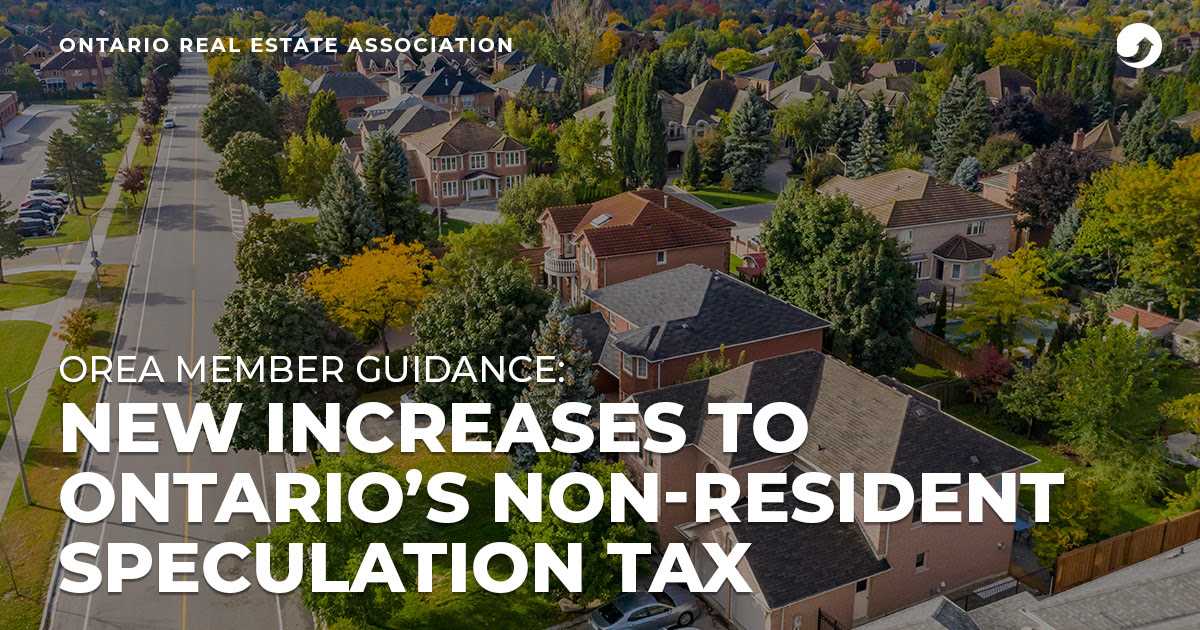On October 25, the Government of Ontario announced amendments to the Non-Resident Speculation Tax (NRST).
Increasing the NRST
As of October 25, 2022, the NRST rate will be increased from 20% to 25% and continues to apply to all regions of the province. The NRST applies to the transfer of “designated land”, which is considered land that contains at least one and no more than six single family residences.
Back in March, the government raised the NRST from 15% to 20%. The new increase to 25% makes this the highest provincial tax in Canada that exists to deter foreign speculation in the housing market.
How the NRST is Applied
The NRST will continue to apply to individuals who are not Canadian citizens or permanent residents of Canada or by foreign corporations or taxable trustees.
Note: The NRST applies if any one of the transferees is a foreign entity or taxable trustee, regardless of their share of ownership. For example, if a transfer of residential property is made to four transferees, only one of which is a foreign entity, the NRST would apply to 100 per cent of the value of the property.
Certain individuals will continue to be exempt from the NRST, including foreign nationals in the Ontario Immigrant Nominee Program, protected persons (refugees), spouses of Canadian citizens, or permanent residents of Canada.
Increasing the tax rate to 25% is an attempt by the Government of Ontario to further deter non-resident investors from speculating in the housing market in hopes that home ownership will become more attainable for Ontario residents.
If my client, who is subject to the NRST, purchased a property before October 25, 2022, would they still pay the new 25% tax rate?
Transitional provisions as part of the increased tax include an exemption from the new rate (25%) if the agreement of purchase and sale on the property was entered into on or before October 24, 2022. Buyers that meet these criteria may still be eligible to pay either the 20% rate (if the agreement was entered into on or after March 30, 2022) or the 15% rate (if the agreement was entered into prior to March 30, 2022). Similarly, no NRST should be payable if the land is located outside of the Greater Golden Horseshoe (defined in the Act) and the agreement was entered into prior to March 30, 2022. The regulation deals with obvious attempts to avoid the tax by characterizing transactions which may originate after those dates as assignments of original agreements of purchase. It does this by specifically applying those same deadlines to assignments of older agreements of purchase and sale.
The tax applies to all transfers of residential property that contains at least one and not more than six single family residences. This includes detached homes, semi-detached, triplexes, duplexes, townhouses and condominium units. It does not matter whether a single family actually resides there nor whether the property is rented or occupied by the owner; it remains taxable so long as it was designed for occupancy as the residence of a family.
The NRST does not apply to other types of land such as land containing multi residential rental apartment buildings with more than six units, agricultural land, commercial land or industrial land.
Is the NRST payable on top of the Land Transfer Tax?
While the NRST is imposed by the Land Transfer Tax Act and administered through the same mechanisms, the NRST, if applicable, is an additional tax that is payable above and beyond the normal Land Transfer Tax by your client.
My clients are looking to purchase a home in Toronto. One is a Canadian citizen, the other is neither a Canadian citizen nor permanent resident nor a protected person. How is the NRST supposed to apply?
If your clients are not spouses as defined in the Land Transfer Tax Act on the date of the home purchase, the NRST should be payable on the full value of the home (one partner’s “portion” or contributions are not exempt, no matter if they are a Canadian citizen).
If your clients are spouses, they should be exempt from the NRST if they are purchasing the house together and no other foreign entities are acquiring an interest in the house. |
